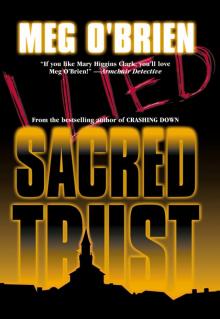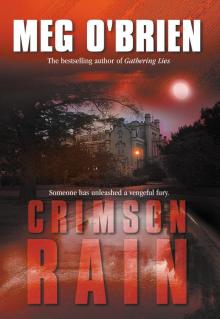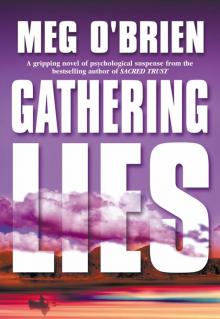- Home
- Meg O'Brien
Gathering Lies Page 23
Gathering Lies Read online
Page 23
“Everyone’s under suspicion here,” I said, “since Jane died.”
“I guess I can understand that.” He stood with his face toward the descending moon, and I saw that the grin had faded a bit.
“I just thought you might be able to use some company,” he said. “Okay if I share your umbrella?”
“Mine?”
“Well, sure. You don’t think you’re immune to being suspect, do you?”
“I hadn’t thought about that,” I said. “But, gee, thanks for giving me something else to worry about. Has someone been talking about me?”
“Oh, everyone’s been talking about everyone. If those ladies in there don’t kill each other before they ever get rescued, I’ll be surprised.”
“What do you mean?”
“Well, first off, they were at each other’s throats over that silly stone game. Then they all came up with reasons to pick at each other—who left the dinner fire burning, who jockeys for the closest place to sleep by the stove, who drank too much water today, who…” He sighed, a deep chuckling sound. “Saints preserve us from quarreling women in the middle of an earthquake.”
I had to smile. “To tell the truth, they were pretty much like that even before the quake.”
He turned to me. “You don’t say? How did you ever last a week like that?”
“I almost didn’t. I was planning to hide out in my cottage for the rest of the month—when all of a sudden I didn’t have a cottage.”
He laughed. “And now you’re all living on top of each other, with everybody thinking the person closest to them killed poor Jane. Sounds like one of those old mystery novels. Ten Little Indians, wasn’t it?”
Kim had mentioned that book, too. A coincidence?
“Speaking of which,” Gabe went on, “it seems astonishing now, but that book of Christie’s first came out as Ten Little Niggers. Did you know? I suppose in the U.K. that was still acceptable in the forties. When it came out over here it was titled And Then There Were None, and only later, Ten Little Indians—” He broke off. “Which isn’t all that politically correct now, either, come to think of it.”
My stomach had done a tiny flip-flop at the use of the N word, which had become so volatile in recent years, especially in courtrooms. Now, since Lonnie Mae, it actually made me cringe.
“No, I didn’t know that about Christie’s book,” I said. “But could you see it being called Ten Little North American Natives? I doubt any New York publisher would let that happen.”
“True. It’s more than two words, isn’t it? Marketing would never go for it.”
I looked at him, surprised. “You sound like you know something about publishing.”
“Not book publishing, as such, but I do have to come up with just the right titles for my software, or it never sells. Just sits there on the shelf growing a beard.” He smiled. “But to get back to Christie, she wasn’t alone in being politically incorrect in that era. Here’s something I came across in my own research for titles. Do you remember the song, ‘Up a Lazy River’?”
“‘…by the old mill run’? Sure. I remember my mother singing it around the house.”
“Well,” he said, “the title originally was ‘Up a Lazy Nigger.’”
“I don’t believe that,” I said even more uneasy now. “I’m sure it’s a myth.”
“Not at all. Would you like to hear the story behind it?”
“Not especially.” I folded my arms. “I’m sure I wouldn’t believe a word of it.”
“Well, trust me,” Gabe said, “you can believe it. According to my research, Hoagy Carmichael—you know who he was? Wrote ‘Stardust,’ and ‘Georgia on My Mind’?”
“One of my favorite songwriters,” I said. “Long before my time, but his music is timeless, as they say.” Where was this leading?
“Right. Well, back in the late thirties, Hoagy was visiting a jazz club where a well-known clarinetist named Sidney Arodin, Jr., was playing. Hoagy was impressed with the music to a song Sidney had written, called ‘Up a Lazy Nigger.’ He told Sidney he loved the music and wanted to have the song published, but that he’d have to change the lyrics. Sidney said fine, and the rest is history.”
“That’s…truly bizarre,” I said. “Are you sure it’s true?”
“Absolutely. The old sheet music even lists the two of them on it. But before you castigate poor old Sidney as a racist, there’s something you need to know. Sidney Arodin was well-known in scholarly jazz circles as the first person to record interracially, with blacks and whites. Apparently, despite his lyrics, he was not at all racist. It just wasn’t uncommon to refer to blacks by the N word back then.”
“I see. And your point in telling me all this, is?”
“That racist behavior, or what is perceived as racist behavior, is not always what it seems. That may be something to keep in mind when you’re working at nabbing those cops you’re after.”
Red flags went up. “Wait a minute. What do you know about that?”
“About your arrest? And the rape of that black woman? Sarah, it was in all the Seattle papers for weeks. And now you’re writing a book about it, right?”
“You are a virtual fount of information,” I said.
“Come now, Sarah, you are here at a writer’s colony,” he said patiently, as if to a child.
“So? Maybe I write poetry.”
“Hardly. No, we’ll leave that to Amelia. The fact is, Sarah, the people I work for ran a thorough investigation on you after your arrest. There isn’t much we don’t know about you—and we didn’t need to read about any of it in the newspapers, or Publisher’s Weekly. Though I must say, they do have you being offered, and accepting, quite a deal. We didn’t know that until recently.”
I stared at Gabe Rossi, my knees going weak and spots forming before my eyes. My flesh turned cold, and when I could speak my voice was no more than a whisper.
“Who the hell are you?” I said.
“I’m somebody who can help you,” Gabe answered. “If you let me.”
“Help me.” I continued to stare. “I don’t—Who are you?”
“Well, I’m not a software developer,” he said, “except by hobby. I’m a cop, Sarah. And I’m Ian MacDonald’s new partner. I was sent here to protect you.”
14
I was speechless. Stunned. Before I could recover, a dark figure moved toward us from the farmhouse. I wasn’t sure, at first, who it was, as the approach seemed almost stealthy. When the figure came close, it stopped short, as if surprised to see us there.
That’s when I saw it was Grace. She called out, “Sarah? Is that you?”
“Watch your step with her,” Gabe said in an undertone. “She is not your friend.”
As Grace came up to us, I saw that she fixed Gabe with a stare. He didn’t give an inch, but continued to stand close to me, almost hovering.
“Timmy was worried about you,” Grace said to me. “I told her I’d come out and see where you were.”
I found my voice. “Well, here I am, Grace.”
“Are you, uh…are you coming in?” She shot a glance at Gabe.
“Yes, I’m coming in. When I’m ready. Is that all right with you?”
She frowned and turned back to the farmhouse, stomping all the way. “Why I even bother…” I heard her mutter.
“Charming lady,” Gabe said. “And don’t you think it’s interesting that she and Luke are chumming around so much?”
I just looked at him, and Gabe shook his head. “Sarah, Sarah, Sarah…I had hoped I’d be able to ease into this. But you’ve got to open your eyes. Luke and Grace are in this together, and they are both a danger to you.”
I couldn’t take my gaze from his mouth, as if by its shape and movement I could detect whether what he said was a lie. “Ease me? Into what?” I managed to say.
He sighed. “All right. Let’s cut to the chase. Luke Ford is keeping all of us on this island. He’s also keeping us out of touch with the mainland. You and I both know w
hy he’s doing that.”
My words came out in a jerky counterpoint to what was in my head. “No. I don’t know why. Why Luke would do that. If he is.”
Taking a step back, I said, “Funny, I don’t recall Ian having a partner. Not in recent years.”
“We started working together a month ago,” Gabe said. “And I’ve been undercover. You wouldn’t have heard of me.”
I was still half in shock and not inclined to buy anything he told me. But I was getting my legs back as well as my voice, and I wanted to hear it all. “Tell me why you think Luke is keeping us here.”
“Isn’t it obvious, Sarah? He’s waiting for you to tell him where the evidence is.”
I kept my expression carefully blank. “Evidence?”
“Why do you think he turned up here so conveniently right after the quake? Why do you think he killed Jane?”
I couldn’t answer.
Gabe took me by the shoulders. “I saw him at the ravine, Sarah. Open your eyes. I can understand that you wouldn’t want to believe it, but you’ve got to. Until you do, you’re leaving yourself open to danger.”
“And you’re suggesting that I do…what?”
“Turn that evidence over to me for safekeeping, Sarah. Let me help you put the Seattle Five away—for good.”
I tried to lick my lips but there was no saliva. “I don’t know what evidence you’re talking about. And even if I did, why should I trust you rather than Luke?”
“Because a man who keeps five women captive on an island when all he has to do is use a cell phone to call for help is not to be trusted.”
“You think Luke has a cell phone?” I said, still not quite willing to give Luke up.
“I don’t think it, I know it. He’s been using it to stay in touch with the people who are after you, Sarah. That’s what he’s here for—to get you.”
My emotions were so mixed, I was shaking. I started to walk back closer to the farmhouse, and safety. But Gabe grabbed me by the arm, pulling me onto a bench. I could have fought him, but something in me still wanted to hear what he had to say. We were within thirty feet of the kitchen door. If he tried anything, I could yell for help.
“Sarah,” he said, sitting beside me, “Ian sent me to help you. You have no idea how much he wanted to come himself. He’s been frantic with worry about you.”
“Oh, has he, now? That’s pretty interesting, Gabe. Especially as Ian hasn’t even spoken to me since I was arrested in January. I guess you didn’t know that.”
“Actually, I do know that. And there was a reason for it. The only way Ian could help you was to keep his distance. If the department thought he was taking sides, he’d have been yanked off the case. As it is, he still can’t appear to be helping you. The Seattle Five have people in power behind them. They have a whole damn committee, in fact—and Judge Ford, Luke’s father, is at the head of it.”
“Luke’s father. Judge Ford. He’s the head of a committee that put the Five in power? But that’s crazy! Judge Ford would never—”
“Sarah, it’s not just him. There are others—people who on the surface seem like nice, ordinary, law-abiding folks. They just happen to believe that bad cops are doing a job that needs to be done when they ‘rid the world of scum,’ as they see it. And you know, Seattle’s not alone in that. In every big city where cops have been arrested for abuse of their badges, there’s someone at the top who at some point, whether their motivation was good or bad, gave them permission to ‘go out and do what needs to be done.’”
There was something to what he said. In researching my book I’d learned that in many people’s minds, the mayor of New York City had created an atmosphere for abuse with his “get tough on crime” policy. No one was saying he intended cops to take that edict and turn it into wrongful shootings or arrests based on ethnicity. But in many cities, cops were being hired too quickly. They weren’t investigated thoroughly enough, and some were known spousal abusers, while others were macho types who just wanted to get out there and act like the vigilante cops they’d seen on TV and in films. The kind of cops who only wanted to serve and protect were being infiltrated by the other kind—and though the good guys are still in the majority, there are enough of the renegades to do a good deal of harm.
But—actual committees who backed the vigilantes? Sent them out to arrest people who might be innocent, with no regard for the rule of law?
And Judge Ford as head of such a committee? It was unthinkable.
But then I remembered that scene, again, from years before. Luke’s father and mine on opposite sides, with Luke’s father arguing that Seattle needed a stronger police force, that there was too much disrespect for the law. My father countering that the police were getting out of hand and that arresting innocent people, besides being immoral, was a complete waste of the police department’s time.
I remembered saying to Luke, “Your father would convict Jesus,” and Luke countering, “Yours would get him off.”
Had Judge Ford, my childhood mentor, gone beyond the law to enforce respect for it? Was that possible?
And had Luke followed in his footsteps?
“What about Luke?” I asked Gabe. “You said he was sent here to ‘get me.’ What did you mean by that?”
“Luke’s father, Judge Ford,” he said, “sent both Luke and Grace here to find out what evidence you have against the Five, and to get it away from you. Ford’s committee doesn’t want the Five going to jail. The Five are the best people they’ve got.”
“The Five are rapists and murderers, for God’s sake! You’re saying they’re the best they’ve got?”
“You’ve just made my point, Sarah.”
I shook my head, trying to clear it. “I can’t believe Luke and Grace would be party to such a thing.”
“Believe it,” Gabe said. “As far as I know, they’ve only worked together this one time, because of Luke’s connection to you. It was thought he’d have the best chance of getting the evidence away from you.”
“What made this committee think I even had any evidence?” I asked.
“Sarah, think. You talked about it openly in Mc-Coy’s bar to one of the Five—Mike Murty. He reported this to Judge Ford, and orders went out from Ford to get that evidence at any cost.”
“Any cost?”
“Sarah, for God’s sake, will you listen to what I’m telling you? Your life is in danger here.”
“And you were sent here by Ian, you say, to protect me.”
“Exactly.”
“Then will you please explain how I got bashed over the head? Where were you then? Off fishing with Amelia, right? And how come…” I stopped myself from saying it: How come the evidence is missing?
“I’ve had to stay undercover,” Gabe said. “I didn’t know whether someone else here might be in on it with Luke and Grace, so I’ve been spreading myself thin—too thin, at the time you were attacked. But I’ve been trying to get to know everyone, find out who might be here under false pretenses.”
“You’re thinking there’s a whole bunch of people here, just waiting to get their hands on that evidence?” I gave a low laugh. “And I thought I was paranoid.”
“Not when you think of what’s at stake—the lives, possibly, of five Seattle cops. Not to mention months of ongoing bad publicity for the force.”
“All right, look. Assuming I’m buying any of this,” I said, “who the hell is Grace? What is she doing here?”
He shrugged. “To be honest, I don’t know who she is, just that she’s in on it with Luke. It’s obvious they know each other, and if that’s true, doesn’t it seem unlikely she’d just happen to be here?”
“But how could Judge Ford arrange to have her invited here? If she’s not even a writer—”
Then I got it. Timmy.
Timmy, who needed money to keep Thornberry alive. Timmy, who had found an investor, just in the nick of time. Timmy—who had invited all of us here.
Judge Ford and our hostess were old, old frien
ds. Would she do anything for him? Or for pay? Had she done anything—including betraying me?
“Does Timmy know about all this?” I asked. “Does she know why she was asked to invite Grace? And about Luke’s involvement?”
“We’re not sure how much she knows,” Gabe said. “But you remember when Luke was pairing people off the other day? Didn’t you think it was odd that he paired you with Timmy? You’re one of the most capable people here—and he virtually confined you to the farmhouse that day.”
Gabe was right. That same day I caught Luke and Grace in the woods, in each other’s arms. And shortly after that, I was attacked at my cottage and the Allegra case disappeared. Moreover, it was Luke and Grace who “found” me.
It all fit—and to continue to deny it would put me in further danger. It wasn’t as though Gabe was telling me something I didn’t, in my heart, already know—that I couldn’t trust Luke and Grace. I’d known that from the moment I’d seen them in the woods, holding each other. I knew it when they broke into laughter together, shutting me out. I knew it when Luke came on to me only a few hours later, as I was sitting outside in the lawn chair. And later, when we danced.
He was working me.
But another thought occurred to me. “It seemed to me,” I said, “that Grace was rather hot and heavy after you the other night, when you were dancing.”
“She was. She wanted to know who I ‘really’ was, where I’d ‘really’ come from. Not that she was all that obvious in her questions, but I knew she and Luke were suspicious of me.”
“What did you tell her?”
“Same thing I’d said before—that I owned a software company, lived in Gig Harbor. Nothing mysterious.”
I sat silently, thinking about what he had told me. In the farmhouse kitchen, candles and lamps had been put out. It was getting late. And dark.
“Sarah,” Gabe said, “I saw your book in that cabin Luke has, back in the woods. The same day I found his cell phone there. I read some of it, and it’s pretty powerful stuff. But that brings to mind a question—why do you think Luke took your manuscript?”
“I’m not sure. To find out how much I know, I suppose.”

 The Last Cheerleader
The Last Cheerleader Sacred Trust
Sacred Trust The Final Kill
The Final Kill Crimson Rain
Crimson Rain Gathering Lies
Gathering Lies